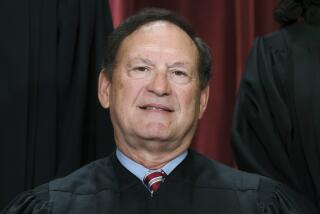Warns of ‘Brainwashing Expeditions’ in Screening Federal Panels : Burger Opposes Role for Lawyers in Selecting Jurors
- Share via
WASHINGTON — Chief Justice Warren E. Burger on Monday sharply denounced proposals that would require federal judges to allow lawyers to question prospective trial jurors--a process, used in California and other states, that he said had resulted in “brainwashing expeditions” by attorneys.
“Under no circumstances should Congress change the jury selection procedure in federal courts,” Burger wrote in his annual year-end Report on the Judiciary. “When lawyers are allowed ‘free rein,’ as is true in some state systems, (jury questioning) is often exploited to become a ‘brainwashing’ expedition as lawyers use the process to influence jurors, not simply to select them.”
The chief justice asserted that increasing the role of attorneys in the jury-selection process had proved “increasingly disruptive” in state courts. Doing so in the federal system, he said, could result in “incalculable delays.”
Burger pointed specifically to the case of convicted Trailside Killer David Joseph Carpenter, whose trial last year in Los Angeles required seven months for jury selection. “By contrast, in England I have observed a jury selected in a criminal case in six minutes,” he said.
The chief justice’s outspoken attack marked the latest round in a widening debate over the role lawyers should play in jury selection--the process in which prospective jurors are questioned, sometimes extensively, about their knowledge and attitude toward a case in order to ensure their impartiality.
Proponents of an increased role for attorneys say that lawyers are better equipped to ask the questions that will unmask any bias or prejudice among prospective jurors. Opponents, meanwhile, say the process takes too long--and that lawyers often abuse it with needlessly intrusive questioning or by trying to indoctrinate jurors before any evidence is presented or testimony is heard.
In federal criminal and civil trials, judges generally maintain tight control over jury selection, in most cases handling the interrogation themselves. As a result, federal juries are selected quickly, usually within a day.
Five Times as Long
But by recent count, at least 19 states give lawyers primary control over the questioning of jurors--and major cases may take weeks or months before the selection process is complete. Studies in New York have shown that while a federal judge takes an average of 2 1/2 hours to impanel a jury, lawyer-conducted jury selection in state courts takes five times as long--with jury selection in 20% of the state cases taking as much time as the trial itself.
In California, jury selection has taken months in several notorious cases. The Hillside Strangler trial of Angelo Buono Jr. took four months to select a jury. Carpenter’s Trailside Killer trial took seven months to pick two juries, one to decide guilt, one to determine the penalty. The selection of a jury in the Lancaster murder trial of Steven Edward Jackson began April 26, 1983, and was not completed until Feb. 6, 1984--an apparent national record of more than nine months.
Burger, in his report, opposed two bills introduced in the last session of Congress that would require federal judges to permit lawyers to question prospective jurors.
‘Unwarranted Burden’
“This would add an intolerable and unwarranted burden on our federal court system,” he said of the bills, both of which still are awaiting action by the Senate. While the proposed system might help obtain a “favorable” jury, neither a lawyer nor a litigant is entitled to anything more than a “fair” jury, he said.
Elsewhere in the report, Burger:
--Called again for congressional action to ease the workload of the Supreme Court. The justices, he said, now are working “beyond any sound maximum limits,” turning out about 150 signed opinions a year, compared to 99 opinions in 1968--the last court term in which the late Earl Warren served as chief justice. The time justices need for reflection on decisions of far-reaching consequence “has been reduced to, and possibly below, an absolute minimum,” Burger said.
Among other things, he urged creation of a temporary special tribunal of judges that would receive certain cases from the Supreme Court to resolve conflicting rulings among the nation’s 13 federal circuit courts of appeal. The tribunal’s decisions would be binding on all federal courts unless modified by the Supreme Court.
--Asked for pay increases for federal judges, whose real income he said had dropped by one-third in the last 15 years because of inflation. At present, federal district judges earn $76,000 a year; appellate judges $80,400; Supreme Court justices $100,600, and the chief justice $104,700. With few exceptions, former Supreme Court law clerks with 10 years’ law practice now earn more than justices, Burger noted. “Fair adjustments” to meet inflation are required to attract and keep the best judges on the bench, he said.
More to Read
Get the L.A. Times Politics newsletter
Deeply reported insights into legislation, politics and policy from Sacramento, Washington and beyond. In your inbox twice per week.
You may occasionally receive promotional content from the Los Angeles Times.










